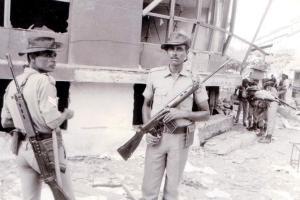Senior journalist Jyoti Punwani, who was in the thick of reporting during the '92-'93 riots, post the Babri Masjid demolition, and has tracked Mumbai's Muslim community since, feels 27 years is too long a time for this generation to hold deep grudges

The riots of December '92 and January '93 that followed the demolition of the Babri Masjid in Ayodhya were the worst the city had seen and changed the social fabric of Mumbai forever
To provide context to our younger readers, give us a sense of what happened during '92-'93 riots.
ADVERTISEMENT
Riots broke out in Mumbai the same evening the Babri Masjid was demolished. They continued for a week in December and for 10 days in January. In December 1992, both Hindus and the Muslims rioted; in January 1993, the Sena was on the offensive. Police used excessive force and some of the firing was unprovoked. The Srikrishna Commission was set up to investigate the riots. Among other things, it recommended action against 31 policemen for communal conduct. None of these recommendations were implemented. About 900 people died; 575 Muslims, 275 Hindus. These were the worst riots that Mumbai had seen.
What were the circumstances that allowed this to happen?
There was a build-up to the demolition of the mosque, including LK Advani's Rath Yatra. In Mumbai too, communal tension was brewing that the authorities didn't take note of and no preventive measures were in place. The police took little action against the Shiv Sainiks because of their own bias; often, they didn't think what the Sainiks were doing was wrong.
How did the demolition in UP change Mumbai?
The feeling of Mumbai being a cosmopolitan city vanished with the riots. It stopped the process of Muslims moving out of Muslim-dominated areas into cosmopolitan neighbourhoods and a majority of those who had got out, went back. There was a sense of isolation. But the community became focussed on education. Barely three years later, you saw the emergence of Muslim toppers across school, boards and competitive exams.
What do you foresee as the aftermath of Saturday's verdict?
It's been 27 years (since the demolition) and we've come a long way. The new generation has little or no memories of what happened (in the riots). Especially, among the Muslims, education has been a confidence booster, and, the experience (of the riots) hasn't held the community back. Of course, this doesn't include those directly affected—who lost their family or were themselves injured —that is a loss that no one can forget.
What does the Muslim community here make of the verdict?
I've been speaking (to members of the community). Most of them seem to be willing to accept the judgment. The general sense is also that enough lives have been lost and that they need to move on. But this could be an acknowledgement that they are living under a majoritarian government. There is also a feeling that other, more pressing issues need to be addressed. Like improving education and building businesses.
Catch up on all the latest Mumbai news, crime news, current affairs, and also a complete guide on Mumbai from food to things to do and events across the city here. Also download the new mid-day Android and iOS apps to get latest updates
 Subscribe today by clicking the link and stay updated with the latest news!" Click here!
Subscribe today by clicking the link and stay updated with the latest news!" Click here!






